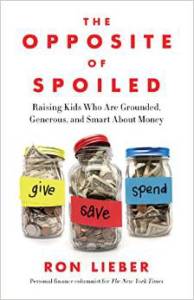 Discover more Jewish values on raising kids who are responsible, grateful and menschy with money on Tues., Nov 29, when NY Times money columnist Ron Lieber speaks.
Discover more Jewish values on raising kids who are responsible, grateful and menschy with money on Tues., Nov 29, when NY Times money columnist Ron Lieber speaks.
When this year’s Slichot speaker, Dr. Dan Gottleib of WHYY hosted his final weekly Voices in the Family last year, he focused the show on gratitude. As callers thanked Dr. Dan for giving them something– courage or patience or thanks… he responded (paraphrased) “I don’t give anyone anything that isn’t already there. It’s about seeing what’s already there.”
Seeing what’s already there– this is Judaism’s approach to Thanksgiving. One Hebrew term for gratitude is “hakarat hatov.” The word thanks isn’t even in there. Hakarat hatov means “recognizing the good.” The good is already there. It’s our mitzvah, our sacred action to, call it out. Why is it so important to call out the good — to see what’s already there?
One response comes from Ron Lieber, a Reform Jew and the author of The Opposite of Spoiled: Raising Kids Who Are Grounded, Generous and Smart About Money, who will be our guest for our Helen and Alfred Sellers lecture Nov 29. Lieber believes that saying grace is one of the single best things parents can do for their kids — no matter what god you do or don’t believe in. He explains there’s a link between gratitude and lower levels of envy and depression, because gratitude helps us to feel a sense of satisfaction, a sense of enough.
Why would young adults who have been raised to say grace, be less likely to overreach on a mortgage? As we would say at the seder table, Dayenu. A sense of enough. It doesn’t slow our ambitions, it helps us cherish and find satisfaction in the possessions we do have.
Why would teenagers who have been raised to say grace become less likely to get themselves into credit card debt? The delayed gratification that comes with a pause before a meal, in a reflection of thanks, might help us to pause before purchasing the item we cannot really afford, and might help us be more satisfied with what we already have.
When we count our blessings, we become less wanting, more fulfilled, more satisfied with our blessings. Now, we live in a broken world plagued by injustice. This outlook does not mean we ought to be satisfied with the world. It just means we might seek to be more satisfied with what we have. Saying thank you or hakarat hatov, recognizing the good, helps us feel the good.
Now, what if you’re having trouble seeing the good, having a sense of gratitude. What if you’re just not feeling it? Do you still acknowledge the good? In a NY Times column, Arthur Brooks recalls the first time he made Thanksgiving dinner for his Spanish in-laws. The holiday was completely new to them. They had never heard of cranberries. He recalls the questions they asked: “What does this turkey eat to be so filled with bread?” And more philosophical: “Should you celebrate this holiday even if you don’t feel grateful?”
Is it inauthentic to express gratitude if you’re just not feeling it? Do you need to have kavannah– intention, for gratitude to be real? Jewish tradition is clear. Gratitude inauthenticity is not a problem. You do not need to wait to feel grateful before you say thank you.
When at the foot of Mt. Sinai, the Israelites received the Torah, they said, “we will do it and we will understand it.” Na-aseh v’nishma. Jewish tradition interprets this to mean: We will do it and then we will understand it. We will act and then we will feel it. Don’t wait until you have perfect kavannah — intention or inspiration– before you begin to make a practice of lighting the Shabbat candles. Just light the candles. The action will lead to the inspiration. Na-aseh v’nishmah. Do it, and then you will understand it.
Say thank you… Then you will feel it. Express gratitude… Then you will gain a sense of enough — the wholeness that comes with fulfillment. Hakarat hatov, recognizing the good helps us feel the good.
So… easy enough, right? A teacher of Mussar, the Jewish system of developing character virtues, Rabbi Bachya ibn Pakudah teaches — NOT so easy. We often suffer a kind of blindness that keeps us from seeing the good, from seeing the abundance we have in our lives. We are so involved in worldly things constantly pursuing them, as if our pursuit could ever be complete. We grow accustomed to our gifts and take things for granted. Or we focus so much on our afflictions, we forget to awaken to the good. No matter our obstacle, tradition is clear: look harder.
Afflictions are real and worthy of compassion. We just cannot allow ourselves to stop there. We have to call out the good. Or we will miss out. We will miss out on the fulfillment, the joy that comes from recognizing, and then feeling, the good.
Perhaps that’s the purpose of Psalm 100 — to speak thanks, in order to feel it:
Shout for joy to the Eternal, all the earth.
Worship God with gladness;
come into God’s presence with singing.
Enter God’s gates with Thanksgiving.
